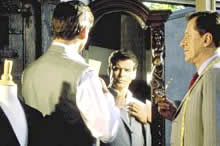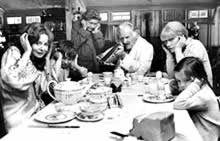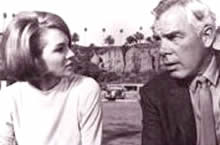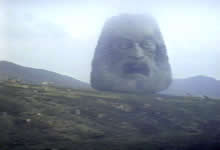Audiences are going to be surprised to see him playing such a nasty piece of work.
We had a test screening in the San Fernando Valley - it's known as the killing fields for movies - and the problem that arose there was this expectation that Pierce would be the hero. When they realised he wasn't, there was a sense of disappointment. As a result I altered the beginning to set him up so you knew from the beginning he was a treacherous character.
Did the studio make you change or remove anything?
At the preview screening, when it came to the point where Pierce looks at Marta and says to Harry, 'Great body as long as she turns her face away when you're f****** her', this collective gasp went up from the whole cinema. They couldn't believe that Pierce Brosnan was saying this line. Afterwards the heads of the studio rushed at me and said, 'You've got to take that line out, you can't have him saying that line'. As you know, it's in the film.

Is there any nervousness at Columbia about the film's attack on George Bush, Snr?
They're very uneasy about this film. I think an attack on the American Right comes at a very sensitive time, particularly as we specifically indict Bush's father for bombing half of Panama. Hollywood are very nervous about censorship in terms of language, violence and sexuality and all that, and this picture is not going to endear Columbia to the Bush family.
Panama itself comes out pretty badly as well. You portray it as a place of sleaze and corruption. Did you have any problems filming there?
One of the reasons that LeCarre didn't come out to Panama when we were shooting the film was because he caused quite a bit of trouble there. The book had been translated into Spanish, and suddenly in political circles they weren't terribly happy about the picture. So I was greeted with hostility when I got there, and it was quite difficult to get cooperation. However all this was solved by Pierce Brosnan. The President of Panama is a very attractive lady who was absolutely entranced with Pierce, and she threw open the place - she probably would have thrown open almost anything, I think -- for us and we got all this astonishing cooperation. She was much more concerned about him than she was about the amour-propre of Panama.

Would you say you portrayed Panama fairly and accurately in the film?
The people in the poorer areas of Panama were wonderful. But there was a ghastly rich community who were just awful, awful people. These were the people running the banks and all the corruption, and they were some of the worst people I've met in my life. They all have bodyguards because everyone's afraid of kidnapping. Basically there are two types of kidnapping in Panama. There's the serious one where the Columbians come over and grab someone and bring him over to Columbia where they're bought and sold. There's a whole trade in this kind of kidnapping and the ransom's usually around $2-3m. Then there's the local guys who just look for $10,000, but you have to produce it within two hours otherwise they kill the victim. We always kept a lot of money in our pocket as we went round the place just in case, but we were left alone.
Looking at your filmography it's very diverse. Did you make a conscious decision early in your career that you weren't going to be pigeonholed?
I just never like repeating myself. One of the problems with filmmaking is boredom. It's such a long, tedious process that it's very easy to get bored. I'm only ever interested in making a film when I want to try and discover what it's about. With this film, for instance, although it came from the book, I did nine drafts of the screenplay. I prepared it very carefully - I always produce a list of shots that we're going to shoot on Monday morning for a whole week - but even then it's still a process of discovery, otherwise the thing is just dead. In this case, as I said, the tone got lighter than I had originally imagined and it became something different. The irony and the satire began to emerge more and the other elements were less expressive.
I'd like to talk about the theme of alienation, which I think keeps recurring in your work. Often your characters are alienated from their environment or, as in the case of Harry Pendel, from themselves.
Yes. And spies like Andy Osnard are always alienated, of course, because all their connections with society are broken, cut away.

So, why do you keep returning to this theme? You have even written that you feel alienated from your own work. When you watch your films, you said, they seem like the work of a stranger.
I don't want to psychoanalyse myself but I suppose if you look at my preface to the script of Hope and Glory, where I am talking about the lower middle-class suburbs around London, which grew up between the wars, they were completely alienating. These were people who had no past, no history, they were refugees from the Industrial Revolution who were coming into these sunny suburbs that were clean, and they threw off their past. They were strangers to themselves and they had this kind of foolish look about them of people who don't know what to do or how to behave. I suppose that was the thing that I came out of. And I suppose that sense of not belonging to anything is what creates that sense of alienation. I also remember that when I was a kid and we lost our house - it was completely burnt, gone, everything - I felt a great sense of freedom. Since then I've always eschewed material possessions, I've never put value on them at all.
That kind of freedom seems expressed in the way you make films. You're an insider in that you work within the studio system, but your attitude is that of an outsider who pursues his own course.
There's one side of me that definitely wants to connect with a large audience. When I first started making movies I thought, 'One day I'm going to make a movie that everyone will love', but this is such a ludicrous ambition to have. It's ridiculous. One day I suddenly went, 'That will never happen so I should stop trying'. From that point on I felt much released from the need to please everyone and ingratiate myself.
You never really seem happy with the work that you have done. You are very hard on yourself.
That's true. I've always had this notion that film is still at an early stage and that film will evolve into something else. I get sort of insights into what it can be, and the ultimate movie, and that is what I'm sort of struggling towards. It was very interesting when I spent some time with David Lean, when he was dying, and we talked about film and what it could be. He had this film, Nostromo, and he talked about this wonderful opening he had under the sea, and he had all these marvellous and extraordinary ideas, and he said, 'The story gets in the way'. I said, 'But you're a narrative man, David' and he said, 'There's something else, though, isn't there. There's something else...' So he had those same intimations that I have. But anyway, time is running out for me as far as filmmaking is concerned.

Is that something you're particularly aware of now?
It takes a couple of years to make a film. I'm 68, how many films can you make? I have films that I want to do and I don't lack energy and I don't lack ideas. But you get to a point where they get nervous about insuring you if you're over 70. David was 81 and he had to have a stand-by director in the wings waiting to step in if he was taken ill. It's physically tough just to do the hours, move around and so on.
Could you not make things easier for yourself by choosing a more hospitable location in which to shoot? Do you film in places like Panama and the Amazon because you need the personal challenge, or because they fit in with your thematic interests?
Partly both. But also I think if you put people, actors for instance, under duress, something suddenly happens: you get past acting. Kubrick did that when he was making The Shining. I had dinner with Jack Nicholson and he said, 'He did 140 takes. It took two days to do one shot. It was just exhausting." Later I spoke to Kubrick and I said, 'Why do that many takes?' He said, 'Well, I try to exhaust the actors because once they're really tired they stop acting'. I do think there is something in putting actors into an environment like the Amazon, or putting them into heat and humidity, that they respond to. It's all about trying to integrate the actors and the environment.
Speaking of the Amazon, the clash between nature and modern man has been another recurring theme in your work, in films such as Deliverance and The Emerald Forest. What was your reaction when Bush announced his retreat from the Kyoto Treaty?
It's an appalling thing, this man is even worse than we imagined he could be. And then there's the other things he's done, like breaking off negotiations with North Korea. It's just unbelievable. Environmentally, my concern is still with the Amazon and there is a plan now to cut down vast areas of the Amazon, and it just horrifies me. This planet can't survive without a huge covering of trees; it modifies the weather, the climate, everything. In a capitalist society, politicians aren't able to deal with long-term issues; they can only deal with crisis management and whatever comes up. So I'm very pessimistic about what's going to happen.
Returning to Deliverance, I watched it recently and felt that the film was an anxiety dream about how masculinity has been made monstrous by being repressed by civilisation. What did you want to say with the film?
The central idea of Deliverance was that you had this river that was a metaphor, a symbol, for life, and it's flow had been stopped by the dam, which is probably the most aggressive act that can be levelled against nature. And what's it for? It is to generate electricity for air-conditioners in Atlanta. So these men are responsible for that in a sense. There's this notion that you have benevolent and malevolent sides of nature, and those hillbillies were the malevolent spirits of the forest who take revenge on these men for being responsible for the destruction of this place. It is fine when people talk about being in harmony with nature and finding a harmonious place within nature, but you have to recognise that just as there is a good and an evil side in men, so there is in nature.
What do you see resulting from the schism between man and nature?
I think that it leads to neurosis. If we're not in touch with other living things on the planet - like animals and trees, the climate and the weather - if we lose touch with all of that, then I think it leads to lots of problems and neurosis. It is easy to forget that we are all a part of nature, and to set ourselves apart is incredibly dangerous.